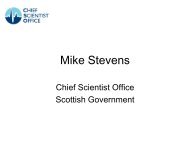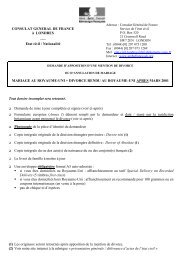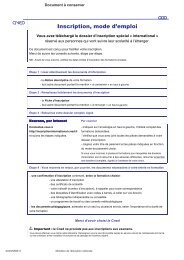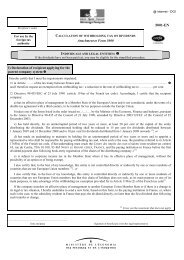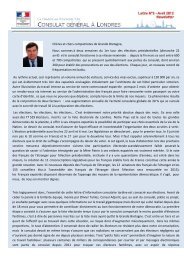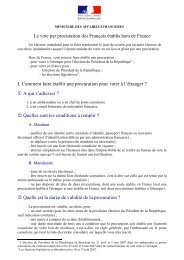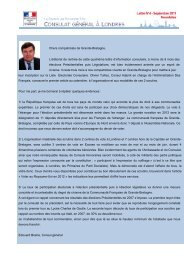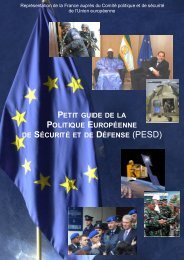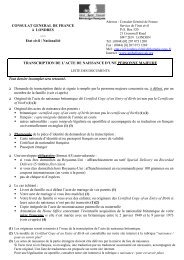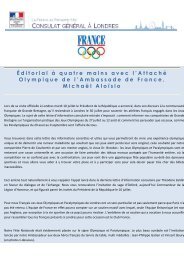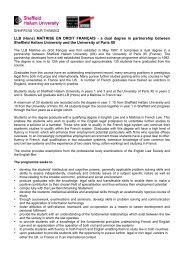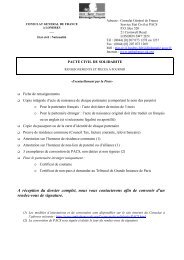Draft Outline For Responsible Innovation Workshop, April / May 2011
Draft Outline For Responsible Innovation Workshop, April / May 2011
Draft Outline For Responsible Innovation Workshop, April / May 2011
You also want an ePaper? Increase the reach of your titles
YUMPU automatically turns print PDFs into web optimized ePapers that Google loves.
Franco-British workshop on responsible innovation London, 23-24 <strong>May</strong> <strong>2011</strong><br />
Franco-British workshop on responsible innovation<br />
From concepts to practice<br />
23-24 <strong>May</strong> <strong>2011</strong><br />
The Residence of the French Ambassador<br />
to Great Britain and Northern Ireland<br />
11 Kensington Palace Gardens<br />
LONDON W8 4QP<br />
Convenors<br />
Maggy HEINTZ<br />
Scientific attaché, physical sciences and<br />
innovation<br />
office +44 (0) 20 7073 1392<br />
mobile +44 (0)7758 317 876<br />
maggy.heintz@ambascience.co.uk<br />
Serge PLATTARD<br />
Science and technology counsellor<br />
office +44 (0) 20 7073 1391<br />
mobile +44 (0)7703 187 986<br />
serge.plattard@ambascience.co.uk<br />
1
Franco-British workshop on responsible innovation London, 23-24 <strong>May</strong> <strong>2011</strong><br />
PROGRAMME<br />
Day 1<br />
9.15: Registration and Coffee/tea<br />
9.45: Welcome address<br />
Bernard EMIE, French Ambassador<br />
Mark SINCLAIR, Science and <strong>Innovation</strong> department, British Embassy Paris<br />
Session 1:<br />
Definitions and concepts of responsible science and innovation<br />
Jack STILGOE (Senior Policy Adviser, Royal Society Science Policy Centre)<br />
10.00: 21 st Century <strong>Innovation</strong> and Entrepreneurship<br />
John BESSANT (Chair in <strong>Innovation</strong> and Entrepreneurship - Exeter University<br />
Associate Dean for Research and Knowledge Transfer - Exeter University)<br />
10.20: <strong>Innovation</strong> in society<br />
Pierre-Benoît JOLY (Senior Research Fellow INRA/SenS and IFRIS, Paris)<br />
10.40: Defining <strong>Responsible</strong> <strong>Innovation</strong>: what, who and how<br />
Judith PETTS (Dean, Social and Human Sciences University of Southampton, member of the<br />
former Royal Commission on Environmental Pollution)<br />
11.00: <strong>Responsible</strong> innovation from an EU Commission Perspective<br />
Gilles LAROCHE (DG Research and <strong>Innovation</strong>, Head of the governance and ethics unit, EC)<br />
11.20: Coffee/tea break<br />
11.40: Promoting responsible innovation: constructive technology assessment and the Dutch experience<br />
Arie RIP (Technology Assessment of Nanotechnology, University of Twente)<br />
12.00: <strong>Responsible</strong> innovation R&D : the US experience<br />
Erik FISHER (Assistant Professor of Political Science, Arizona State University)<br />
12.20: An initial cross UK Research Council Framework for responsible innovation<br />
Richard OWEN (European Centre for Environment and Human Health, University of Exeter)<br />
12.40: <strong>Responsible</strong> innovation: the French experience<br />
Rémi BARRE (Professor of Science Policy,CNAM)<br />
13.00: Networking lunch<br />
2
Franco-British workshop on responsible innovation London, 23-24 <strong>May</strong> <strong>2011</strong><br />
Session 2:<br />
<strong>Responsible</strong> science and innovation: case studies of emerging technologies<br />
Robert FALKNER (Senior Lecturer in International Relations - London School of Economics and<br />
Political Science)<br />
Xavier PAVIE (Senior Researcher, Executive director, ESSEC-ISIS)<br />
14.00: Plenary session-Introduction of the theme for the afternoon<br />
How do we move from innovation to responsible innovation? What tools and approaches can we<br />
bring together? What is the current state of the science in this area? What challenges are there for<br />
their implementation? What current areas of emerging science and innovation can we apply these to,<br />
and how? Who should take these forward?<br />
14.10: Roundtable session<br />
Roundtable sessions will be run as case studies, each tackling a specific emerging area of science and<br />
innovation (a) Physical sciences and nanotechnology, (b) Health and life sciences, (c) Environment and<br />
low carbon energies, (d) Information technologies and communications, to answer the following<br />
questions :<br />
How do you define responsible innovation ?<br />
What key principles should underpin a responsible innovation approach?<br />
What have we learnt from experiences with this specific emerging area of technology ?<br />
What role do you, as individuals, does your organisation / institution have in the context of<br />
responsible innovation?<br />
How should we proceed?<br />
15.10: Rapporteurs feedback to plenary<br />
15.40: Coffee/tea break<br />
Session 3:<br />
<strong>Innovation</strong> and emerging technologies: opening up the debate<br />
Nikolas ROSE (Professor of Sociology - London School of Economics and Political Science)<br />
Manoelle LEPOUTRE (Senior Vice President, Sustainable Development and Environment, TOTAL)<br />
16.00: New technologies in society: opening up the debate<br />
Kathy SYKES (Professor of Science and Society, Bristol University)<br />
16.20: French experiences in public engagement around new technologies<br />
Jean-Luc PUJOL (Environment and society, INRA)<br />
16.40 Roundtable session - UK and French experiences compared in the field of dialogue and engagement<br />
concerning new technologies:<br />
Phil MACNAGHTEN (Professor of Geography, Durham University)<br />
Dominique PECCOUD (Membre de l’académie des technologies)<br />
Roundtable sessions will be run as case studies, each tackling a specific emerging area of science and<br />
innovation (a) Physical sciences and nanotechnology, (b) Health and life sciences, (c) Environment and<br />
low carbon energies, (d) Information technologies and communications, to answer the following<br />
questions :<br />
What engagement and dialogue activities have been done in each country?<br />
What have we learned and how should we proceed?<br />
3
Franco-British workshop on responsible innovation London, 23-24 <strong>May</strong> <strong>2011</strong><br />
17.20: Feedback from roundtables<br />
17.40: Wrap up and summary of day 1<br />
Andy STIRLING (Research Director at SPRU, Science and Technology Policy Research,<br />
University of Sussex)<br />
Pierre-Benoît JOLY (Senior Research Fellow INRA/SenS and IFRIS, Paris)<br />
18.00: End day 1<br />
Day 2<br />
Session 4<br />
<strong>Responsible</strong> and safe design<br />
Safe design of next generation nanomaterials as a case study<br />
Richard HANDY (School of biomedical and biological sciences, Plymouth)<br />
Daniel BLOCH (Medical advisor for nanomaterials, CEA)<br />
09.00: Safe design and public engagement around nanotechnologies<br />
Christophe VIEU (Professor of Physics and Researcher, LAAS, Toulouse)<br />
09.20: Beyond Nanoparticles: next generation nanomaterials. What are the next generation nanomaterials<br />
and in what sectors?<br />
Peter DOBSON (Director of Oxford University’s Begbroke Science Park, RCUK<br />
Nanotechnologies Champion)<br />
9.40: Designing in safety for next generation nanomaterials: learning from experiences with<br />
nanoparticles<br />
Ken DONALDSON (ELEGI Colt Laboratory, Edinburgh)<br />
10.00 : Safe design of next generation nanomaterials for consumer products<br />
Daniel BERNARD (Senior scientific advisor, ARKEMA)<br />
10.20: Coffee/tea break<br />
Session 5:<br />
Adaptive governance and regulation of disruptive innovation<br />
Catherine LARRIEU (Chef de délégation au développement durable, MEDDTL)<br />
10.40: Regulation of disruptive innovation: UK experiences<br />
Robert LEE (Co-director ESRC Centre on Business Relationships, Accountability, Sustainability<br />
and Society centre)<br />
11.00: French Experiences concerning the governance of new technologies<br />
Alexei GRINBAUM (Researcher, CEA Saclay)<br />
11.20: Governance of emerging technologies<br />
Steve RAYNER (Director of the Institute for Science, <strong>Innovation</strong> and Society, Oxford University,<br />
Saïd Business School)<br />
4
Franco-British workshop on responsible innovation London, 23-24 <strong>May</strong> <strong>2011</strong><br />
11.40: Roundtable session - UK and French experiences compared in the governance of specific areas of<br />
science and innovation<br />
Gary KASS (Principal Specialist in Strategic Futures, Natural England)<br />
Françoise RUSSO-MARIE (Diretor Génopôle d’Evry, Research Department)<br />
Roundtable sessions will be run as case studies, each tackling a specific emerging area of science and<br />
innovation (a) Physical sciences and nanotechnology, (b) Health and life sciences, (c) Environment and<br />
low carbon energies, (d) Information technologies and communications, to answer the following<br />
questions :<br />
<br />
<br />
<br />
What forms of governance and regulation have been applied in the area of emerging<br />
technology / innovation?<br />
What have we learned?<br />
What recommendations can we make?<br />
12.40: Feedback from roundtables<br />
13.00: Networking lunch<br />
Session 6:<br />
From concepts to practice: implementation<br />
Nicola GOLDBERG (Portfolio Manager, EPSRC, Engineering and Physical Science Research Council)<br />
Jean-Pierre CHEVALIER (Agence nationale pour la recherche)<br />
14.00: Plenary discussion - Introduction of the theme for the afternoon<br />
Learning from the discussions and presentations during the workshop, each roundtable is a ‘steering<br />
group’ for a new major R&D (part public and part private funded) initiative of 50M€ in one of the<br />
following areas: (a) next generation nanomaterials, (b) synthetic biology, (c) geoengineering, (d) next<br />
generation web technologies.<br />
They must decide what they will ask should be included in the programme to ensure a responsible<br />
innovation approach and identify challenges and barriers to implementation for actors in the process.<br />
15.00: Feedback from each group<br />
15.20: Coffee/tea break<br />
15.40: <strong>Workshop</strong> wrap-up<br />
Andy GIBBS (Head of Education, Economy, Business and Society Research team, ESRC,<br />
Economic and Social Research Centre)<br />
16.10: <strong>Workshop</strong> close<br />
Serge PLATTARD<br />
Maggy HEINTZ<br />
5
Franco-British workshop on responsible innovation London, 23-24 <strong>May</strong> <strong>2011</strong><br />
Biographical sketches<br />
Speakers and chairs<br />
Rémi BARRÉ<br />
Professor of Science Policy at CNAM (Conservatoire national des arts et métiers)<br />
Rémi BARRÉ holds a Civil Engineering degree (Ecole des Mines) and a Doctorate in Economics from the Ecole<br />
des Hautes Etudes en Sciences Sociales (EHESS) (Paris).<br />
He is Professor of Science Policy at CNAM university and, since 2003, scientific advisor, to the Futuris - ANRT<br />
research and innovation policy think-tank. He has participated to several High level groups to the EU<br />
Commission; he has chaired the EU expert group on the indicators for the monitoring of the European<br />
Research Area (2009).<br />
He has been, from 2006 to 2009, head of the strategy and foresight unit of the General Directorate for<br />
Research and <strong>Innovation</strong> (DGRI) of the French Research and Higher Education Ministry (MESR); in this capacity<br />
he has been vice-chair of the working group of the Council of Strategic Analysis (CAS) which has produced the<br />
European Research Area vision report. He has been Director of the <strong>For</strong>esight unit of INRA (national institute for<br />
agronomic research) (2003-2006) and of the Observatoire des Sciences et des Techniques (OST) from 1990 to<br />
2001.<br />
Daniel BERNARD<br />
Senior Scientific Advisor for Nanotechnology and Sustainable Development - Arkema<br />
He graduated in 1968 from the Ecole Nationale Supérieure de Chimie de Paris. He earned a PhD in Chemistry<br />
and the Docteur ès Sciences Physiques degree in 1974 from the Pierre and Marie Curie University (Paris).<br />
Dr BERNARD entered the French Council for Scientific Research (CNRS), as research fellow (1970 – 1976). Then<br />
he joined the chemical branch of Elf Aquitaine Group in 1976, in various Research and Development positions.<br />
In 1992 he was R&D Director for the Elf Atochem Industrial Chemical Specialties Division, and in 1999 Elf<br />
Aquitaine R&D Vice president for North America. In 2002 he was appointed as Scientific and Technology Senior<br />
Advisor for ATOFINA.<br />
He is member of the High Level Group for Key Emerging Technologies at the DG Enterprise, and of the<br />
Nanofutures Platform of the DG Research of the European Commission. He is the french representative at the<br />
OECD Working Party on Manufactured Nanomaterials, member of the Nano Management Team of the<br />
European Chemical Industry Council (CEFIC) and Chairman of the Producer Association of Carbon nanoTubes in<br />
Europe (PACTE-CEFIC). Nanomaterials advisor for the Union des Industries chimiques (UIC), he is member of<br />
the Nanotechnology Scientific Committee of the Agence Nationale de la Recherche (ANR), and chairman of the<br />
Working Group Nanotechnology of the Conseil National des Ingénieurs et Scientifiques de France (CNISF).<br />
He is heavily involved in standardization activities related to Nanotechnology and Nanomaterials as Chairman<br />
of the X457 Committee of AFNOR, secretary of CEN TC 352 and head of the french delegation for ISO TC 229.<br />
John BESSANT, BSc., PhD.<br />
Chair in <strong>Innovation</strong> and Entrepreneurship - Exeter University<br />
Associate Dean for Research and Knowledge Transfer - Exeter University<br />
Originally a chemical engineer, John has been active in the field of research and consultancy in technology and<br />
innovation management for over 25 years. He currently holds the Chair in <strong>Innovation</strong> and Entrepreneurship at<br />
Exeter University where he is also Associate Dean for Research and Knowledge Transfer. In 2003 he was<br />
awarded a Fellowship with the Advanced Institute for Management Research and was also elected a Fellow of<br />
the British Academy of Management. He has acted as advisor to various national governments and to<br />
international bodies including the United Nations, The World Bank and the OECD.<br />
He is a regular speaker at corporate events, conferences and centres such as Cranfield, the Irish Management<br />
Institute and the Scandinavian Management Institute. Consulting clients include Toyota, Novo-Nordisk, Lego,<br />
Morgan Stanley, Coloplast, Corus, Danfoss, GSK, Grundfos, Hewlett-Packard, Kumba Resources.<br />
He is the author of 15 books and many articles on the topic and has lectured and consulted widely around the<br />
world. His most recent books include ‘Managing innovation’ (awarded the ‘best book’ prize by the<br />
6
Franco-British workshop on responsible innovation London, 23-24 <strong>May</strong> <strong>2011</strong><br />
International Association for Management of Technology), ‘<strong>Innovation</strong> and entrepreneurship’ and ‘High<br />
involvement innovation’ (all published by John Wiley and Sons).<br />
Daniel BLOCH<br />
Medical advisor for nanomaterials - CEA<br />
Daniel Bloch, MD, graduated at the Medical School of Paris V and specialized in occupational health and<br />
radioprotection. He served as an occupational physician at CEA, the French Commission for atomic energy and<br />
alternative energies, for more than 20 years, focusing in particular on chemical risk management in<br />
microelectronics research laboratories. In the early 2000s’, the rapidly growing CEA nanotechnology research<br />
activities led him to address HSE issues related to nanomaterials. In 2008, he was appointed CEA medical<br />
advisor for nanomaterials. He was part of the expert groups driven in 2006 and 2008 by the French Agency for<br />
Environmental and Occupational Safety (AFSSET, recently merged in ANSES) and dedicated to Nanomaterials<br />
and health & environmental issues. He now contributes to the IReSP (Institute for Public Health Research), the<br />
French Observatory for Micro and Nanotechnologies (OMNT), the European Observatory for NanoSafety<br />
(EONS) and the European program NanoImpactNet. He is also involved in standardisation, contributing to the<br />
work of HSE groups within AFNOR, CEN and ISO. He regularly gives lectures within the INSTN (National<br />
Institute for Nuclear Science and Technology, part of the CEA), a higher education institution, during training<br />
sessions for radioprotection an safety engineers.<br />
Jean-Pierre CHEVALIER<br />
Responsable, Département Ingénierie, Procédés et Sécurité - Agence Nationale de la Recherche<br />
Jean-Pierre Chevalier first read physics and then obtained a Ph.D. (1977) from the University of Cambridge. He<br />
then joined the Centre National de la Recherche Scientifique (CNRS) and was head of a major national<br />
metallurgy laboratory for over 12 years. He can probably be best described as a physicist working in the fields<br />
of metallurgy and materials science. He has extensive experience of electron microscopy of materials and,<br />
more specifically, has been involved in structural studies of disordered systems (metallic glasses and shortrange<br />
ordered alloys), heterogeneous materials (interfaces in semiconductors, metal-ceramic bonds,<br />
multilayers and other nanomaterials) and in structural studies of alloys. His recent interest lies in the analysis<br />
of materials requirements for sustainability (energy production, energy saving, reduction of CO 2 emissions and<br />
availability of mineral ressources). On leave from the CNRS, he was appointed to the chair of Industrial<br />
Materials at the Conservatoire National des Arts et Métiers in Paris in 2000. In 2009, he joined the Agence<br />
Nationale de la Recherche as head of the Engineering, Processes and Security department. He has authored<br />
over 100 scientific publications.<br />
Peter DOBSON<br />
Director of Oxford University’s Begbroke Science Park<br />
After a career as a lecturer in Physics at Imperial College and Senior Principal Scientist at Philips Research<br />
laboratories he was appointed to a University Lectureship and College Fellowship at the Queen’s College<br />
Oxford in 1988 and a Professorship in 1996. At Oxford his research moved into the areas of nanoparticles,<br />
nanostructures, optoelectronics and biosensors. In 1999 he spun-off a company, now called Oxonica plc, that<br />
specializes in making nanoparticles for a wide range of applications, ranging from sunscreens to fuel additive<br />
catalysts and bio-labels. In 2000, with colleagues in Chemistry and Engineering, he spun-off Oxford Biosensors<br />
Ltd that made a hand-held device based on enzyme-functionalized microelectrode arrays. He was appointed to<br />
his present position in August 2002 and has the responsibility of setting up new research institutes that<br />
combine University activities with company R&D, and leading a team that facilitates the rapid transfer of<br />
technology and knowledge. This has led to him being in demand internationally to advise on Knowledge<br />
Transfer. He consults widely and advises several corporate and national organizations on nanotechnology. His<br />
research interests are very broad, covering most aspects of nanotechnology, and embracing biotechnology,<br />
environmental technology, energy, materials science, especially the applications to medicine. He is also<br />
currently(2009-2012) the Strategic Advisor on Nanotechnology to the Research Councils in the UK.<br />
P J Dobson, BSc, MA (Oxon), PhD, C Phys, F Inst P, Member of the ACS.<br />
7
Franco-British workshop on responsible innovation London, 23-24 <strong>May</strong> <strong>2011</strong><br />
Ken DONALDSON<br />
Professor of Respiratory Toxicology<br />
Scientific Director of the ELEGI Colt Laboratory - Queens Medical Research Insititute, University of Edinburgh<br />
Ken Donaldson (KD) is the Scientific Director of the ELEGI Colt Laboratory in the Queens Medical Research<br />
Insititute, University of Edinburgh, where he is Professor of Respiratory Toxicology. Ken is recognized as an<br />
expert in the mechanisms of lung disease caused by inhaled particles and fibres in ambient and workplace air.<br />
In this capacity he has provided expert opinion and consultancy to the US Environmental Protection Agency<br />
(North Carolina), US Health Effects Institute (Massachusetts), World Health Organisation, International Agency<br />
for Research on Cancer (Lyon France), WHO Air Quality and Health (Bonn, Germany), UK Medical Research<br />
Council, UK Health and Safety Executive, etc. Ken has sat on government committees pertaining to toxicology<br />
of air pollutants – Committee on the Medical Effects of Air Pollution (COMEAP) and Expert Panel on Air Quality<br />
Standards (EPAQS) and Advisory committee on Hazardous Substances. He has published over 300 scientific<br />
papers review and book chpaters on lung injury caused by inhaled particles and over 100 on ultrafine particles/<br />
nanoparticles. He currently has a research programme into the adverse effects of nanoparticles on the lungs<br />
and cardiovascular system, high aspect ratio nanoparticles and structure/toxicity relationships for<br />
nanoparticles. He is Founding Editor of the journal ‘Particle and Fibre Toxicology’ and Co-Editor of the<br />
textbook ‘Particle Toxicology’, (2007).<br />
Robert FALKNER<br />
Senior Lecturer in International Relations - London School of Economics and Political Science (LSE) Senior<br />
Research Fellow - LSE Global Governance<br />
Dr Robert Falkner is Senior Lecturer in International Relations at the London School of Economics and Political<br />
Science (LSE) and Senior Research Fellow at LSE Global Governance. He directs the Nanotechnology Policy and<br />
Regulation programme at LSE and in 2008-2009 coordinated an international research project on EU and US<br />
nanomaterials regulation, which resulted in the publication of the Chatham House report Securing the Promise<br />
of Nanotechnologies: Towards Transatlantic Regulatory Cooperation (2009). Robert holds Masters degrees in<br />
Politics and Economics from Munich University and a doctorate in International Relations from Oxford<br />
University. In 2006-07, he was a visiting scholar at Harvard University. He is the author of Business Power and<br />
Conflict in International Environmental Politics (Palgrave 2008) and editor of The International Politics of<br />
Genetically Modified Food: Diplomacy, Trade and Law (Palgrave 2007).<br />
Erik FISHER<br />
Assistant professor of Political Science - Arizona State University<br />
Erik Fisher is an Assistant Professor of Political Science at Arizona State University. He holds a joint<br />
appointment in the School of Politics and Global Studies and the Consortium for Science, Policy and Outcomes.<br />
He serves as the Assistant Director for International Activities of the Center for Nanotechnology in Society<br />
(CNS-ASU). Fisher also serves as Principal Investigator of the STIR (Socio-Technical Integration Research)<br />
project, which coordinates over 20 laboratory engagement studies in a dozen nations and as co-leader of a<br />
CNS-ASU research thrust. Fisher’s research interests are in governance of emerging technologies, research<br />
policy, the public value of science, and midstream modulation. He co-edited the first volume of the Yearbook<br />
of Nanotechnology in Society and has published in Science and Public Policy, Scientometrics, Technology in<br />
Society and EMBO Reports. Fisher holds a Ph.D. in Environmental Studies (University of Colorado, Boulder), an<br />
MA in Classics (University of Colorado, Boulder) and a BA in Philosophy and Mathematics (St. John’s College,<br />
Annapolis).<br />
Andy GIBBS<br />
Head of the Education, Economy, Business and Society Research Team - ESRC<br />
Andy Gibbs has worked for the ESRC since 1981 in a range of roles, primarily in corporate activities. Between<br />
2007 and 2009 he was seconded to RCUK as a workstream lead in the project to establish a new Shared<br />
Services Centre for the Research Councils. Since January 2010, he has been the Head of the Education,<br />
Economy, Business and Society Research Team in the ESRC’s Research Directorate responsible for developing<br />
8
Franco-British workshop on responsible innovation London, 23-24 <strong>May</strong> <strong>2011</strong><br />
and commissioning research in these areas. He represents ESRC on the Cross-Council Nanotechnologies<br />
Coordination Group.<br />
Nicola GOLDBERG<br />
Portfolio Manager, EPSRC (Engineering and Physical Sciences Research Council)<br />
Nicola Goldberg has worked at the Engineering and Physical Sciences Research Council (EPSRC) for 5 years,<br />
most recently in the Nanotechnology and Healthcare Programmes. She currently coordinates EPSRC’s<br />
<strong>Responsible</strong> <strong>Innovation</strong> activity which has included a pilot study on how <strong>Responsible</strong> <strong>Innovation</strong> could be<br />
operationally implemented within our research funding activities.<br />
Alexei GRINBAUM<br />
Researcher - CEA-LARSIM - Saclay<br />
Alexei Grinbaum is a researcher at CEA-LARSIM located in Saclay near Paris. His main interest is in the<br />
philosophy of physics and the foundations of quantum mechanics. Since 2003 he has also been working on the<br />
ethical and social aspects of nanoscience and nanotechnology. Grinbaum's early publications in this area focus<br />
on the uncertainty of technological progress and the problem of governance, including a critique of the<br />
precautionary principle ("Living With Uncertainty: Toward a Normative Assessment of Nanotechnology",<br />
Techné 8(2):4-25, 2004), and on public perception of nanotechnology ("Cognitive Barriers in Perception of<br />
Nanotechnology," Journal of Law, Medicine and Ethics, 34(4): 689-694, 2006). His later work bears on the<br />
question of narratives of nanotechnology ("The Nanotechnological Golem", Nanoethics, 4(3):191-198, 2010).<br />
He is a coordinator for France of the European observatory of nanotechnology, where his principal<br />
contribution is the Toolkit for Ethical Reflection and Communication on Nanotechnology<br />
(http://www.observatorynano.eu/project/catalogue/4ET).<br />
He is a frequent speaker at public debates on nanotechnology and science & society conferences both in<br />
France and internationally.<br />
Richard HANDY<br />
Director of the Ecotoxicology Research and <strong>Innovation</strong> Centre - University of Plymouth<br />
Professor Richard D. Handy is a fish toxicologist and comparative physiologist with 20+ years experience and is<br />
the Director of the Ecotoxicology Research and <strong>Innovation</strong> Centre at the University of Plymouth. The centre<br />
has a strong theme on nanoscience: (http://www.plymouth.ac.uk/research/eric). Professor Handy has<br />
published over 100 papers and book chapters on fish ecotoxicology, including about 20 papers on<br />
nanomaterials in the last 3 years. Prof. Handy is expert on the dietary uptake of contaminants in fish including<br />
methods for making diets containing nanomaterials, and protocols for in vivo exposure from the food. He is<br />
expert on epithelial biology/unstirred layer chemistry and the role of mucus in uptake across membranes; and<br />
has detailed expertise on membrane transport systems and mechanisms of uptake. His laboratory is<br />
recognised for in vitro organ perfusion techniques for measuring uptake (e.g. gut and gill perfusions in fish,<br />
other organs in mammals) and he is an expert histopathologist with an extensive archive of nanopathologies<br />
from different animals, and unique expertise on brain pathologies from nanomaterials in fish. His laboratory is<br />
currently investigating TiO 2 , Cu-NPs, Ag-NPs, SW-CNT, and C 60 . His work is supported by national level grants<br />
(e.g., Natural Environment Research Council, UK) and in EU partnerships (e.g., NanoImpactNet). He has written<br />
several reviews on manufactured NPS, edited special issues, reported on test methods to the UK government<br />
(founder member of the UK task force), and via the OECD working party on nanomaterials. He also has a<br />
clinical research programme that includes cardiotoxicology, and more recently the risks of nanomaterials in<br />
dentistry.<br />
Pierre-Benoît JOLY<br />
Economist and sociologist, Directeur de recherche at the National Institute of Agronomic Research (INRA)<br />
Pierre-Benoît Joly, economist and sociologist, is Directeur de recherche at the National Institute of Agronomic<br />
Research (INRA) in France. He holds a degree in agronomy (1982), a PhD in economics (1987) and the<br />
“Habilitation à diriger les recherches” (1995). He is the Director of the IFRIS (French Institute for Studies of<br />
Research and <strong>Innovation</strong> in Society).<br />
9
Franco-British workshop on responsible innovation London, 23-24 <strong>May</strong> <strong>2011</strong><br />
Since 1996, his research activities are focused on the governance of collective risks, socio-technical<br />
controversies, the use of scientific advice in public decision making and the forms of public participation in<br />
scientific activities. He was Member of the expert group “Science and Governance” at the European<br />
Commission, he is Member of the Council of European Association for the Study of Science and Technology<br />
(EASST) and of the French Comité de Prévention et de Précaution and he chairs the Scientific Council of the<br />
Programme on GMOs at the French Ministry for Ecology. He has published about one hundred articles (of<br />
which more than 50 in refereed journals), three books and he has coordinated five special issues of social<br />
sciences journals. He lectures at Ecole des Hautes Etudes en Sciences Sociales (EHESS) on « Science, expertise<br />
and public debate » and at Sciences Po Paris on Risk Governance.<br />
Gary KASS<br />
Principal Specialist in Strategic Futures, Natural England<br />
Gary Kass is Principal Specialist in Strategic Futures at Natural England, the statutory adviser to the UK<br />
government on the natural environment in England. At Natural England, he is responsible for the design and<br />
delivery of a programme of futures-oriented analysis and synthesis on a range of issues that could affect the<br />
future of England’s natural environment. Among the critical challenges, he is examining the potential risks and<br />
opportunities offered from new and emerging areas of science and technology, exploring how the innovation<br />
system might seek to embed sustainability as a core part of its purpose.<br />
Before joining Natural England, Gary was Assistant Director in the Science and Society Directorate of the (then)<br />
Office of Science and <strong>Innovation</strong>, where he established and led a programme to engage members of the public<br />
in constructive dialogue on new and emerging areas of science and technology, and a programme of research<br />
to explore public attitudes towards science, engineering and technology.<br />
Before this Gary was head of the energy and environment programme at the Parliamentary Office of Science<br />
and technology, based in the Westminster Parliament. Here, he was responsible for a programme of work to<br />
inform parliamentary debate on issue arising at the interface of science and policy. Gary’s main work areas<br />
included environment, sustainability, energy and innovation policy.<br />
Gilles LAROCHE<br />
Head of the Unit "Ethics and Gender" - Directorate General for Research and <strong>Innovation</strong> - European<br />
Commission<br />
Since January <strong>2011</strong>, Gilles Laroche is the Head of the Unit "Ethics and Gender" of the Directorate General for<br />
Research and <strong>Innovation</strong> of the European Commission. This Unit is responsible for the management of the<br />
"Science in Society" programme which covers public engagement and participation of citizens and civil society<br />
organisations in the research and innovation process, gender equality, science education, access to scientific<br />
results, science communication, ethics and governance.<br />
Gilles Laroche is a lawyer and he joined the European Commission (Directorate General for Agriculture) in<br />
1991. From 1993 to 1996, he worked at the Joint Research Centre in Ispra (Italy). Returning to Brussels in<br />
1996, he continued his career in the Directorate General for Research and <strong>Innovation</strong> in the "Biotechnology"<br />
programme until 2003 when he was appointed Head of the Unit "Internal Control". In 2006, he became Head<br />
of the Unit responsible for "Strategic Planning and Programming".<br />
Catherine LARRIEU<br />
Head of the Delegation for Sustainable Development, Commissioner General for Sustainable Development<br />
(Department of Ecology, Sustainable Development, Transportation and Housing)<br />
<strong>For</strong>mer student of Ecole Polytechnique (1980-1983) and holder of a DEA in economics, Catherine Larrieu is<br />
Chief Engineer of Bridges, Water and <strong>For</strong>estry. She has held several positions at the Ministry of Agriculture<br />
from 1985 to 1989, departmental and regional level.<br />
In 1989, she joined the National Agency for Promotion of Research (Anvar). First « chargé d'affaires » (account<br />
manager) in Rhône-Alpes for the agri-food, she then coordinated national expansion to all areas of technology<br />
development networks, associative structures for SME support co-financed by the State and regions, and<br />
developed in Nord-Pas de Calais a cross-border cooperation in the field of materials and surface treatments.<br />
Appointed Regional Director Anvar Nord-Pas de Calais in 1999, she set up partnerships with the Regional<br />
Council, the State services and socio-economic organizations, in the form of operational and financial support<br />
10
Franco-British workshop on responsible innovation London, 23-24 <strong>May</strong> <strong>2011</strong><br />
innovation of SMEs. Catherine Larrieu joined in 2005 the general direction of the new OSEO group, born from<br />
the merger of Anvar and BDPME, until 2007. She prepared the enlargement of the activity of the ex-Anvar,<br />
both in relation to mid-sized companies than to the clusters.<br />
After two missions within the General Inspectorate of Finance, she was appointed Head of the Delegation for<br />
Sustainable Development in August 2008 in the Commissioner General for Sustainable Development recently<br />
established. The Delegation for Sustainable Development develops missions pulse, business intelligence and<br />
monitoring for the consideration of sustainable development into all policies and with actors of civil society.<br />
She participates in the Grenelle de l’Environment, which coordinates the monitoring by the National<br />
Committee on Sustainable Development and Environment Round Table, involving all stakeholders and chaired<br />
by the Minister. It also develops the consultations on the conditions for a transition to an economy both<br />
greener and more equitable central axis of the National Strategy for Sustainable Development adopted in<br />
2010.<br />
Robert LEE<br />
Co-Director of the ESRC Centre on Business Relationships, Accountability, Sustainability and Society (BRASS)<br />
Professor Robert Lee has been Head of Cardiff Law School, and is currently a Co-Director of the ESRC Centre on<br />
Business Relationships, Accountability, Sustainability and Society (BRASS) (www.brass.cardiff.ac.uk) which<br />
works on issues of business and sustainability/social responsibility. He is a professional development<br />
consultant with the Environment Products and Regulation Group of the European law firm, Freshfields<br />
Bruckhaus Deringer. Bob has a book on the regulation of biomedicine and another on food regulation. As part<br />
of a team from the Society of Environmental Toxicologists and Chemists, he has contributed to a guide to<br />
environmental standard setting. He has undertaken work for government in the UK on both regulation and self<br />
regulation as it relates to nanomaterials and is currently working on a guide to nanomaterials’ regulation for<br />
the British Standards Institution. He is an honorary life member of the UK Environmental Law Association and a<br />
Fellow of the Royal Society of Medicine.<br />
Manoelle LEPOUTRE<br />
Senior Vice President, Sustainable Development and Environment, TOTAL<br />
Manoelle Lepoutre is Senior Vice President, Sustainable Development and Environment, Member of the Total<br />
Management Committee since June 2009.<br />
She began her career for Elf in Exploration and Production Research & Development, where she was in charge<br />
of Basin Modelling (petroleum evaluation of sedimentary basins and of exploration prospects).<br />
She had then several positions in Exploration, as an operational geologist in France and then getting<br />
progressively larger responsibilities, as Area Exploration Manager in The Netherlands, Vice President<br />
Exploration in Norway for Elf, then Vice President Geosciences in the US for Total, from 2000 to 2003 before<br />
being assigned Vice President Research and Development for Total Exploration and Production in 2004.<br />
Manoelle Lepoutre is a graduate from « École Nationale Supérieure de Géologie de Nancy » (France) and from<br />
the French Petroleum Institute High School (ENSPM).<br />
Phil MACNAGHTEN<br />
Professor of Geography - Durham University<br />
Phil Macnaghten is Professor of Geography at Durham University. His research has concentrated on the<br />
governance of science and technology, the study of socio-nature, public deliberation, comparative research,<br />
and qualitative methodology with a particular emphasis on discourse and narrative approaches. His principal<br />
publications include: Contested Natures (Sage, 1998), Bodies of Nature (Sage, 2001), Governing at the<br />
Nanoscale (Demos, 2006), Reconfiguring Responsibility (European Commission, 2009) as well as a number of<br />
edited collections and papers. He contributes to debates on the governance of science and technology in the<br />
UK, Europe and Brazil and is currently is a member of the UK’s Engineering and Physical Science Research<br />
Council’s (EPSRC) Societal Issues Panel.<br />
11
Franco-British workshop on responsible innovation London, 23-24 <strong>May</strong> <strong>2011</strong><br />
Richard OWEN<br />
Chair in <strong>Responsible</strong> <strong>Innovation</strong>, Environment and Health - University of Exeter Business School<br />
Professor Owen holds a Chair in <strong>Responsible</strong> <strong>Innovation</strong>, Environment and Health at the University of Exeter<br />
Business School, where he sits in the School of Management. He holds a joint appointment with the European<br />
Centre for Environment and Human Health. His primary research involves understanding the responsible<br />
emergence of disruptive innovation and new technologies in democratic society. He has worked closely with<br />
the UK Research Councils in this regard, including current funding from ESRC and EPSRC to develop a<br />
<strong>Responsible</strong> <strong>Innovation</strong> Framework for operational use by them. In previous roles he led on emerging risks in<br />
his capacity as Head of Environment and Human Health at the Environment Agency (UK) and as Chair of the<br />
OECD Steering Group on Risk Assessment of Nanomaterials. He has a background in risk assessment,<br />
governance and regulation, working at the interface between disciplines to support national and international<br />
policy development.<br />
Xavier PAVIE<br />
Researcher and Lecturer in innovation management and strategy at ESSEC Business School<br />
Xavier Pavie is the Executive Director of the Institute for Service <strong>Innovation</strong> & Strategy (ESSEC). Graduate in<br />
business science as well as in philosophy, Mr. Pavie has held executive position in leading companies such as<br />
Unilever and Nestlé for fifteen years. After several years as a Marketing Director at Club Med especially<br />
focusing on innovation, he has decided to join academia to strengthen the team of ESSEC in innovation<br />
management.<br />
Mr. Pavie's publications and public appearances emphasise philosophical approaches on responsibleinnovation<br />
as a source of innovation and performance. He published several articles and books in philosophy<br />
(about spirituals exercises) and also in innovation.<br />
Dominique PECCOUD<br />
<strong>For</strong>mer Special Adviser to the Director-General of the International Labour Organization for Socio-Religious<br />
affairs (1996-2008)<br />
Dominique Peccoud, a French Jesuit born in 1946, has been Special Adviser to the Director-General of the<br />
International Labour Organization for Socio-Religious affairs from 1996 to 2008. In addition to this position, he<br />
was in charge of managing relations between the ILO and Non Governmental Organizations (NGOs).<br />
A member of the French Academy of Agriculture and of the French National Academy of Engineering,<br />
D. Peccoud advises public and private organizations on the ethical dimensions of social and economic issues<br />
regarding the application of new technologies. Prior to joining the ILO, he was President of a technological<br />
graduate school in Toulouse (France). Earlier times he was lecturing at the PARIS VII University and was<br />
headmaster of the "Ecole Sainte Geneviève", a famous college in Versailles.<br />
Dr. Peccoud holds a doctorate in theoretical computer science from the Sorbonne in Paris and master's<br />
degrees in philosophy and theology.<br />
Judith PETTS<br />
Dean of Social and Human Sciences - University of Southampton<br />
Professor Judith Petts is Dean of Social and Human Sciences at the University of Southampton a post she has<br />
held since October 2010. The Faculty is a £55m activity crossing subjects as diverse as Maths and Social Policy<br />
with over 5000 students and 450 staff. Prior to this she was Pro-Vice-Chancellor, Research and Knowledge<br />
Transfer, at the University of Birmingham (2007-10) and Head of the School of Geography, Earth and<br />
Environmental Sciences, from 2001-2007. She was also Director of the Centre for Environmental Research and<br />
Training, and as at Southampton, held the Chair of Environmental Risk Management. Prior to joining<br />
Birmingham (1999) she was Director of the Centre for Hazard and Risk Management, Loughborough<br />
University.<br />
Judith has over 30 years applied strategic interdisciplinary research experience in the broad area of<br />
environmental risk management Her research spans three primary areas: environmental governance and<br />
policy-making, science-society relationships, and public perceptions, responses and behavior. She has acted as<br />
12
Franco-British workshop on responsible innovation London, 23-24 <strong>May</strong> <strong>2011</strong><br />
a government advisor across multiple Departments and Agencies and also as a special advisor to the House of<br />
Commons and House of Lords. She was a member of Council of the Natural Environment Research Council<br />
(2000-6).<br />
Judith is currently a Member of the Royal Commission on Environmental Pollution, a Member of EPSRC’s Societal<br />
Issues Panel, and of the Steering Group of the Sciencewise Expert Resource Centre.<br />
Jean-Luc PUJOL<br />
INRA, National Institute of Agronomy<br />
Jean-Luc Pujol is a former student of Ecole Normale Superieure and graduated from ENGREF, school of<br />
management in agronomy, forestry, water and environmental science and technology. He was science and<br />
technology adviser at the Center for Strategic Analysis for 4 years. He now works at the National Institute of<br />
Agronomy where he is in charge of a mission of anticipation in the relation between science and society. He<br />
was a moderator of a panel of experts mobilised as support for the special commission of public debate on<br />
nanotechnology.<br />
Steve RAYNER<br />
James Martin Professor of Science and Civilization<br />
Director of the Institute for Science, <strong>Innovation</strong> and Society - Oxford University’s Saïd Business School<br />
Steve Rayner is James Martin Professor of Science and Civilization and Director of the Institute for Science,<br />
<strong>Innovation</strong> and Society at Oxford University’s Saïd Business School, from where he also directs the Oxford<br />
Programme for the Future of Cities and Co-directs the Oxford Geoengineering Programme. He is also Honorary<br />
Professor of Climate Change and Society at the University of Copenhagen. He previously held senior research<br />
positions in two US National Laboratories and has taught at leading US universities. He has served on various<br />
US, UK, and international bodies addressing science, technology and the environment, including Britain’s Royal<br />
Commission on Environmental Pollution, the Intergovernmental Panel on Climate Change and the Royal<br />
Society’s Working Group on Climate Geoengineering. Until 2008 he also directed the national Science in<br />
Society Research Programme of the Economic and Social Research Council. He was included in the 2008 Smart<br />
List by Wired Magazine as “one of the 15 people the next US President should listen to”.<br />
Arie RIP<br />
Technology Assessment of Nanotechnology - University of Twente<br />
Arie Rip was educated as a chemist and philosopher at the University of Leiden. In the 1970s, he set up and led a<br />
program of teaching and research in Chemistry and Society in that University. He was Professor of Science<br />
Dynamics at the University of Amsterdam (1984-1987) and Professor of Philosophy of Science and Technology at<br />
the University of Twente (1987-2006) where he continues after his retirement. He holds a Visiting Professorship<br />
at the University of Stellenbosch, South Africa. Currently, he leads a research program on Technology Assessment<br />
of Nanotechnology (as part of the Dutch R&D Consortium NanoNed). His other main research interests are the<br />
changes in knowledge production and the future of science institutions.<br />
Nikolas ROSE<br />
Professor of Sociology - London School of Economics and Political Science (LSE)<br />
Director of the BIOS Centre for the Study of Bioscience, Biomedicine, Biotechnology and Society<br />
Nikolas Rose is Martin White Professor of Sociology, and Director of the BIOS Centre for the Study of<br />
Bioscience, Biomedicine, Biotechnology and Society at the London School of Economics and Political Science.<br />
He is also co-PI for the LSE-Imperial College Centre for Synthetic Biology and <strong>Innovation</strong> (CSynBI). His most<br />
recent books are The Politics of Life Itself : Biomedicine, Power, and Subjectivity in the Twenty-First Century<br />
(Princeton, 2006) and (with Peter Miller) Governing The Present (Polity, 2008). The outcome of his recent<br />
research with Joelle Abi-Rached on the political, social, legal and economic implications of recent<br />
developments in the brain sciences will be published as Neuro: the New Brain Sciences and the Remaking of<br />
the Human (Princeton, 2012). He is co-editor of BioSocieties: an interdisciplinary journal for social studies of<br />
the life sciences, Chair of the European Neuroscience and Society Network, and a member of numerous<br />
advisory groups including the Nuffield Council on Bioethics.<br />
13
Franco-British workshop on responsible innovation London, 23-24 <strong>May</strong> <strong>2011</strong><br />
Françoise RUSSO-MARIE<br />
Research Director at INSERM ( French National Health and Medical Research Institute)<br />
Director of the Genopole® research department<br />
Françoise Russo-Marie obtained her MD and PhD at the University of Paris VII and holds the title of Research<br />
Director of INSERM (French National Health and Medical Research Institute). She has been appointed as<br />
director of the Genopole® research department. She has been chair of an INSERM Research Unit for 12 years,<br />
has created and led a biotechnology company where she worked as CEO and CSO, has monitored and<br />
evaluated 2 of the major French Institutes of Research.<br />
Françoise Russo-Marie research activities were developed in the domain of cell biology, with the aim of<br />
understanding the mechanisms of corticosteroids in inflammatory diseases. She has contributed to the<br />
discovery of annexins and devoted most of her research to study structure-function relationships of annexins.<br />
Jack STILGOE<br />
Senior Policy Adviser, Royal Society<br />
Jack Stilgoe is Senior Policy Adviser at the Royal Society, where he looks after work on science, innovation and<br />
governance. Before the Royal Society, he spent four years at the independent think tank Demos, leading work<br />
on science and society. He is author of Citizen Scientists (Demos, 2008) Nanodialogues (Demos, 2007), The<br />
Received Wisdom (Demos, 2006) and The Public Value of Science (Demos, 2005). He has published academic<br />
papers in the journals Science and Public Policy, Public Understanding of Science and Science, Technology and<br />
Human Values. He is on the editorial board of Public Understanding of Science. He is an honorary research<br />
fellow of University College London and a Demos associate.<br />
Andy STIRLING<br />
Professor of Science and Technology Policy - Research Director at SPRU (Science and Technology Policy<br />
Research) - University of Sussex<br />
Andy Stirling is Professor of Science and Technology Policy and Research Director at SPRU (science and<br />
technology policy research) at the University of Sussex, where he co-directs the ESRC Centre on 'Social,<br />
Technological and Environmental Pathways to Sustainability' (STEPS; jointly with IDS) and the Sustainable<br />
Lifestyles Research Group (SLRG; jointly with Surrey). He has a background in natural and social science,<br />
working formerly as an archaeologist, then a disarmament and environment activist. <strong>For</strong> twenty years, he has<br />
been an interdisciplinary researcher and policy adviser, focusing on challenges in the governance of science,<br />
technology and innovation – including: ‘risk’, ‘uncertainty’ and ‘precaution’; ‘sustainablity’, ‘resilience’ and<br />
‘diversity’; and ‘participation’, ‘transformation’ and ‘power’. He has published widely on these issues and<br />
served on several public advisory bodies including EU committees on Energy Policy, Science in Society, Public<br />
Engagement, Sustainable Development, Science Governance. In the UK, he has served on the Advisory<br />
Committee on Toxic Substances, GM Science Review Panel, DEFRA Science Advisory Council and the BIS<br />
Sciencewise Expert Group – as well as working groups for the Royal Society and Nuffield Council on Bioethics.<br />
Kathy SYKES – OBE<br />
Professor of Sciences and Society at the University of Bristol<br />
Since 2002, Kathy has worked on culture shift in Universities, funding bodies and Government, helping<br />
improve dialogue with the public, to make better policy decisions and do better research.<br />
Kathy has sat, or sits, on strategic panels in public engagement in science for many funders of science and<br />
learned societies, for examples the Royal Society, the Wellcome Trust, and the EPSRC. She was a member of<br />
the Council for Science and Technology, the government's top advisory body on science and technology policy<br />
issues, advising the Prime Minister from 2004-2010. She chairs the 'Sciencewise' Strategy Group, which aims to<br />
increase and improve public dialogue on science and technology across Government Departments and<br />
Agencies.<br />
She helped to create the hands-on science centre Explore AtBristol, the Times Cheltenham Science Festival and<br />
NESTA Famelab - a national, but increasingly international, competition which talent-spots and trains new<br />
science communicators. She presents television science programmes and comments in the media about<br />
14
Franco-British workshop on responsible innovation London, 23-24 <strong>May</strong> <strong>2011</strong><br />
science. Her PhD is in Physics.<br />
Christophe VIEU<br />
Professor of physics - INSA Toulouse<br />
Researcher - LAAS-CNRS and ITAV, Centre Pierre Potier<br />
Christophe Vieu, PhD in solid state physics is professor of physics at the National Institute of Applied Sciences<br />
(INSA), an Enginnering school of Toulouse. He is conducting research in the field of Nanobiotechnologies in the<br />
Laboratory of Architecture and Analysis of Systems (LAAS) of CNRS organisation. Main fields of interest are:<br />
Nanopatterning, Biopatterning, Nanoscale devices and tools for biodetection and medecine, education in<br />
Nanotechnologies. He recently joined an interdisciplinary research and industrial transfert Institute (ITAV) of<br />
the Toulouse Canceropole.<br />
Author of more than 150 publications in international conference proceedings, journals and books, he has<br />
been involved in several European projects and international cooperations.<br />
15
Franco-British workshop on responsible innovation London, 23-24 <strong>May</strong> <strong>2011</strong><br />
Contact details<br />
SPEAKERS/CHAIRS<br />
BARRE Remi CNAM remi.barre@cnam.fr<br />
292 rue Saint-Martin<br />
F-75141 Paris Cédex 03<br />
BERNARD Daniel ARKEMA daniel.bernard@arkema.com<br />
Scientific Senior Advisor 33 (0)1 49 00 78 73<br />
Direction Recherche Developpement<br />
420 Rue D'Estienne D'Orves<br />
Colombes F-92705<br />
BESSANT John Director of Research johnrbessant@googlemail.com<br />
Professor of <strong>Innovation</strong> and Entrepreneurship<br />
University of Exeter Business School<br />
Streatham Court<br />
Streatham Campus<br />
University of Exeter<br />
Exeter<br />
EX4 4ST<br />
BLOCH Daniel Medical advisor for nanomaterials daniel.bloch@cea.fr<br />
CEA-Grenoble Services de maîtrise des<br />
risques/GMR 33 (0)4 38 78 35 46<br />
17, rue des Martyrs<br />
38054 Grenoble cedex 9<br />
CHEVALIER Jean-Pierre<br />
Responsable du dpt Ingénierie, Procédés et<br />
Sécurité<br />
Jean-pierre.CHEVALIER@agencerecherche.fr<br />
Agence Nationale de la Recherche<br />
212, rue de Bercy<br />
75012 Paris<br />
DOBSON Peter Academic Director of Begbroke Science Park, peter.dobson@eng.ox.ac.uk<br />
University of Oxford, 44 (0)1865 283780<br />
Sandy Lane,<br />
Kidlington,<br />
Oxon, OX5 1PF<br />
DONALDSON Ken ELEGI Colt Laboratory ken.donaldson@ed.ac.uk<br />
Centre for Inflammation Research, 44 (0)131 651 1437<br />
Medical School, University of Edinburgh,<br />
Edinburgh, Midlothian<br />
EH 8 9AG<br />
FALKNER Robert Senior Lecturer in International Relations R.Falkner@lse.ac.uk<br />
Senior Research Fellow, LSE Global Governance 44 (0)20 7955 6347<br />
London School of Economics<br />
Houghton Street<br />
London WC2A 2AE<br />
FISHER Erik Assistant Professor of Political Science efisher1@asu.edu<br />
School of Politics and Global Studies (480) 965-9744<br />
Arizona State University<br />
GIBBS Andy Head of Educ., Economy, Busi. and Soc. Res. Team Andy.Gibbs@esrc.ac.uk<br />
Economic and Social Research Council 44 (0)1793413103<br />
Polaris House<br />
North Star Avenue<br />
Swindon SN2 1UJ<br />
16
Franco-British workshop on responsible innovation London, 23-24 <strong>May</strong> <strong>2011</strong><br />
GOLDBERG Nicola Portfolio Manager Nicola.Goldberg@epsrc.ac.uk<br />
Engineering and Physical Sciences Research<br />
Council 44 (0)1793444475<br />
Polaris House<br />
North Star Avenue<br />
Swindon<br />
SN2 1ET<br />
GRINBAUM Alexei CEA-Saclay alexei.grinbaum@cea.fr<br />
SPEC/LARSIM (bât. 774) 33 (0)1 69 08 12 17<br />
91191 Gif-sur-Yvette Cedex, France<br />
HANDY Richard School of Biomedical and Biological Sciences R.Handy@plymouth.ac.uk<br />
Davy Building, University of Plymouth, Drake<br />
Circus, 44 (0)1752 584630<br />
Plymouth, Devon, PL4 8AA<br />
JOLY Pierre-Benoît Directeur de l'IFRIS joly@inra-ifris.org<br />
Institut Francilien Recherche, <strong>Innovation</strong> et<br />
Société<br />
Cité Descartes<br />
5 boulevard Descartes<br />
Champs sur Marne<br />
77454 Marne-la-Vallée Cedex 2<br />
KASS Gary Principal Specialist gary.kass@naturalengland.org.uk<br />
Strategy and Environmental Futures 44 (0)7920756743<br />
Natural England<br />
LARRIEU Catherine Ministry of Ecology, Sustainable Development,<br />
Catherine.LARRIEU@developpementdurable.gouv.fr<br />
Transport and Housing (MEDDTL) 33 (0)1 40 81 34 64<br />
Office of the Commissioner General for<br />
Sustainable Development<br />
Head of the Sustainable Development Delegation<br />
3 place de Fontenoy<br />
75007 Paris<br />
LAROCHE Gilles Chef de l'Unité "Gouvernance et éthique" Gilles.Laroche@ec.europa.eu<br />
Direction générale de la Recherche (32-2) 299 11 22<br />
Commission européenne<br />
Square de Meeûs 8, BE-1050 BRUXELLES<br />
LEE Robert Centre for Busi. Relationships, Account., LeeRG@cf.ac.uk<br />
Sustain. and Soc. 44 (0)29 208 74352<br />
Cardiff University<br />
55 Park Place<br />
Cardiff<br />
CF10 3AT<br />
LEPOUTRE Manoelle Directeur du Développement durable et de l’Envir. manoelle.lepoutre@total.com<br />
Total<br />
2, place Jean Millier<br />
La Défense 6<br />
92078 Paris La Défense Cedex<br />
Founding Director of the Inst. of Hazard and Risk<br />
MACNAGHTEN Philip Res.<br />
p.m.macnaghten@durham.ac.uk<br />
Durham University 44 (0) 191 33 41990<br />
Department of Geography<br />
Science Laboratories<br />
South Road, Durham<br />
DH1 3LE, UK<br />
OWEN Richard University of Exeter Business School r.j.owen@exeter.ac.uk<br />
Streatham Court 44 (0)7875 205915<br />
Rennes Drive<br />
Exeter<br />
17
Franco-British workshop on responsible innovation London, 23-24 <strong>May</strong> <strong>2011</strong><br />
EX4 4PU<br />
PAVIE Xavier Directeur Exécutif ESSEC-ISIS pavie@essec.edu<br />
ESSEC-ISIS 33 (0)1 34 43 36 21<br />
ESSEC Business School<br />
Av. Bernard Hirsch<br />
B.P. 50105<br />
95021 Cergy Pontoise Cedex<br />
PECCOUD Dominique Académie des technologies dpeccoud@gmail.com<br />
Grand Palais des Champs Elysées - Porte C<br />
Avenue Franklin D. Roosevelt<br />
75008 Paris<br />
PETTS Judith Dean, Social and Human Sciences J.Petts@soton.ac.uk<br />
University of Southampton 44 (0)23 8059 5663<br />
Member ex Royal Commission on Envir. Pollution<br />
Murray Building<br />
Southampton<br />
SO17 1BJ<br />
PUJOL Jean-Luc INRA : MaR/S jeanlucpujol@aol.com<br />
Mission d'anticipation Rech./Soc. & Dév. durable 33 (0)1 42 75 91 17<br />
147 rue de l'Université<br />
75338 Paris Cedex 07<br />
RAYNER Steve Director, Institute for Science, Innov. and Society steve.rayner@sbs.ox.ac.uk<br />
Keble College 44 (0)1865288938<br />
Oxford<br />
OX1 3PG<br />
RIP Arie Professor of Philosophy of Science and Technology a.rip@utwente.nl<br />
School of Management and Governance (053) 489 4026<br />
University of Twente<br />
MB-STePS<br />
PO Box 217<br />
7500 AE Enschede<br />
ROSE Nikolas Department of Sociology n.rose@lse.ac.uk<br />
Martin White Professor of Sociology 44 (0)20 7955 7533<br />
BIOS (Centre for the study of Bioscience,<br />
Biomedicine, Biotechnology and Society)<br />
London School of Economics<br />
RUSSO-MARIE Françoise Director Genopole Research Francoise.Russo-Marie@genopole.fr<br />
5, Rue Henri Desbruères 33 (0)1 60 87 84 42<br />
91 030 Evry Cedex - France<br />
STILGOE Jack Science Policy team jack.stilgoe@royalsociety.org<br />
Royal Society 44 (0)20 7451 2530<br />
6-9 Carlton House Terrace<br />
London SW1Y 5AG<br />
STIRLING Andy The Sussex Energy Group a.c.stirling@sussex.ac.uk<br />
University of Sussex 44 (0)1273 877118<br />
Brighton<br />
SYKES Kathy Professor of Sciences and Society Kathy.Sykes@bristol.ac.uk<br />
Institute for Advanced Studies<br />
The Royal <strong>For</strong>t House<br />
University of Bristol<br />
Bristol, BS8 1UJ<br />
VIEU Christophe LAAS-CNRS cvieu@laas.fr<br />
Groupe NBS- Nanobiosystèmes 33 (0)5 61 33 69 65<br />
7, avenue du Colonel Roche<br />
31077 Toulouse Cedex 4<br />
18
Franco-British workshop on responsible innovation London, 23-24 <strong>May</strong> <strong>2011</strong><br />
ATTENDEES<br />
AMOUROUX Jacques Chimie Paris Tech jacquesamouroux@gmail.com<br />
Dpt de Chemical Engineering UPMC/ENSCP jacques-amouroux@chimie-paristech.fr<br />
11, rue Pierre et Marie Curie 33 (0)1 44 27 68 14<br />
75231 Paris cedex 05<br />
BORDE Jacques 4 rue de Messine jaborde@free.fr<br />
75008 Paris France 33 (0)6 81 90 78 12<br />
CAPDEVILA Jean-Marc Conseiller nucléaire jean-marc.capdevila@cea.fr<br />
French Embassy 44 (0)20 7073 1067<br />
CHIOCCA Massimo Area Responsabilità Sociale delle Imprese mchiocca@lavoroetico.org<br />
CSR Dept. 0543-38233<br />
Centro per l'Innovazione e lo Sviluppo Economico<br />
Corso della Repubblica, 5<br />
I - 47100 <strong>For</strong>lì<br />
CLAES Merel Research Assistant merel@edcw.org<br />
Ecodesign Centre 44 (0)29 2064 7034<br />
Cardiff Business Technology Centre,<br />
Senghennydd Road,<br />
Cardiff<br />
CF24 4AY<br />
COLEMAN Andrea Director andrea.coleman@youngfoundation.org<br />
The Young Foundation 44 (0) 20 8821 2852<br />
18 Victoria Park Square<br />
Bethnal Green<br />
LONDON E2 9PF<br />
COPE David POST coped@parliament.uk<br />
7 Millbank 44(0)2072192848<br />
Westminster<br />
London<br />
SW1P 3JA<br />
DELACOTE Goery CEO gd@at-bristol.org.uk<br />
At Bristol 44 (0)1179157156<br />
Anchor road<br />
Harbourside<br />
Bristol<br />
BS1 5DB<br />
DELACOTE Stéphane Administrateur de la fondation de l'ecole stephane.delacote@gmail.com<br />
des mines FI3M 44 (0)20 3239 2321<br />
Observatoire de l'innovation responsable<br />
DESWARTE Fabien Science and <strong>Innovation</strong> Network Fabien.Deswarte@fco.gov.uk<br />
British Embassy 33 (0)1 44 51 33 31<br />
35 rue faubourg saint honoré<br />
75008 Paris<br />
DOUBLEDAY Robert Senior Research Associate rvld2@cam.ac.uk<br />
Department of Geography 44 (0)1223 760 563<br />
University of Cambridge<br />
Downing Place<br />
Cambridge CB2 3EN<br />
ELWOOD Paul Leeds University p.ellwood@leeds.ac.uk<br />
Management of emerging technologies<br />
GENTHON Bénédicte Economic Counsellor Benedicte.GENTHON@dgtresor.gouv.fr<br />
French Embassy 442 070 731 181<br />
58, Knightsbridge<br />
London SW1X 7JT<br />
19
Franco-British workshop on responsible innovation London, 23-24 <strong>May</strong> <strong>2011</strong><br />
GIUSSANI Donatella London Representation d.giussani@hotmail.com<br />
Observatory for <strong>Responsible</strong> <strong>Innovation</strong><br />
GROVES Chris Research Associate GrovesC1@cardiff.ac.uk<br />
ESRC Centre for Business Relationships, 44 (0) 2920 877438<br />
Accountability, Sustainability and Society<br />
Cardiff University<br />
55 Park Place<br />
Cardiff<br />
CF10 3AT<br />
GULBRANDSEN Elisabeth Special Adviser egu@rcn.no<br />
Department for Analysis and Development 4 793 413 355<br />
Division for <strong>Innovation</strong><br />
The Research Council of Norway<br />
HILL Steven Head of RCUK Strategy Unit steven.hill@rcuk.ac.uk<br />
Polaris House 44 (0)1793 444400<br />
North Star Avenue<br />
Swindon SN2 1ET<br />
HITCHCOCK Julian Senior Associate Julian.hitchcock@ffw.com<br />
Field Fisher Waterhouse LLP 44 (0)20 7861 4690<br />
KANELLOPOULOU Maria Political Officer Marie-Madeleine.Kanellopoulou@ec.europa.eu<br />
Rep. of the European Commission to the UK 44(0)20 79731980<br />
32 Smith Square<br />
London SW1P 3EU<br />
KEARNES Matthew Department of Geography M.B.Kearnes@durham.ac.uk<br />
Durham University 44 (0) 191 334 1873<br />
Durham, DH1 3LE<br />
KITNEY Richard Professor of BioMedical Systems Engineering r.kitney@imperial.ac.uk<br />
Department of Bioengineering 44 (0)20 7594 5184<br />
Imperial College London<br />
South Kensington Campus<br />
London, SW7 2AZ<br />
KURT Aygen Ethical Governance of Emerging Tech. Project a.kurt@mdx.ac.uk<br />
School of Engineering and Information Sciences<br />
Middlesex University<br />
The Burroughs<br />
Hendon<br />
London NW4 4BT<br />
LACOSTE Annalivia Observatory for <strong>Responsible</strong> <strong>Innovation</strong> annalivia.lacoste@mines-paristech.fr<br />
Mines ParisTech 33 (0)1.40.51.92.86<br />
Fondation des Industries Minérales, Minières<br />
et Métallurgiques Françaises<br />
Centre de Sociologie de l'<strong>Innovation</strong><br />
Paris, J.204<br />
LA PORTA Filomena EDF Energy Filomena.LaPorta@edfenergy.com<br />
Head of UK R&D Partnerships<br />
Walter House<br />
418 - 422 Strand<br />
London, WC2R 0PT<br />
LARKIN Ken Chief Executive klarkin@rvc.ac.uk<br />
London BioScience <strong>Innovation</strong> Centre 44 (0) 20 7691 2076<br />
2, Royal College Street<br />
London<br />
NW1 0NH<br />
LLEWELLYN Ian Queen Mary ipl@dcs.qmul.ac.uk<br />
University of London 44 (0)2078828021<br />
Mile End Road<br />
London<br />
20
Franco-British workshop on responsible innovation London, 23-24 <strong>May</strong> <strong>2011</strong><br />
E1 4NS<br />
MacEWEN Alison Science and <strong>Innovation</strong> Network Alison.MacEwen@fco.gov.uk<br />
British Embassy<br />
35 rue faubourg saint honoré<br />
75008 Paris<br />
MAGOCSI Laszlo Science & Technology Attaché LMagocsi@mfa.gov.hu<br />
Embassy of the Republic of Hungary 44 (0)20 7201 3456<br />
35 Eaton Place<br />
London SW1X 8BZ<br />
MARRIS Claire Senior Research Fellow C.Marris@lse.ac.uk<br />
BIOS (Centre for the Study of Bioscience, Biomed.,<br />
Biotechnology and Society)<br />
London School of Economics and Political Science<br />
Houghton Street, London, WC2A 2AE, UK<br />
McHUGH Shane The Royal Academy of Engineering shane.mchugh@raeng.org.uk<br />
3 Carlton House Terrace 44 (0)20 7766 0600<br />
London SW1Y 5DG<br />
MILLS Peter Assistant Director dmills@nuffieldbioethics.org<br />
Nuffield Council on Bioethics 44 (0)20 7681 9619<br />
28 Bedford Square, London, WC1B 3JS<br />
REMOLA Stephanie Senior Policy Manager stephanie.remola@esrc.ac.uk<br />
UK NCP for the Science in Society programme<br />
(FP7) 44 (0)1793 41 3146<br />
International Section<br />
Economic and Social Research Council<br />
RITZ Jean-Benoît EDF Energy Jean-Benoit.Ritz@edfenergy.com<br />
UK R&D coordination director<br />
Walter House<br />
418 - 422 Strand<br />
London, WC2R 0PT<br />
SANSOM Nigel NHS <strong>Innovation</strong> Centre nigel.sansom@institute.nhs.uk<br />
6 th Floor 44 (0)207 633 7129<br />
New Kings Beam House<br />
22 Upper Ground<br />
London SE1 9BW<br />
SAUER Peter Counsellor wiss-1@lond.auswaertiges-amt.de<br />
Head of Division 44 (0) 20 78 24 13 46 (47)<br />
Science, Technology & Environmental Policy<br />
German Embassy<br />
23 Belgrave Square<br />
London SW1X 8PZ<br />
SIMAKOVA Elena University of Exeter Business School e.simakova@exeter.ac.uk<br />
Streatham Court 44 (0)1392726271<br />
Streatham Campus<br />
University of Exeter<br />
Exeter<br />
EX4 4ST<br />
SIMON-<br />
DELAVELLE Frédérique Counsellor for Labour, Health and Social affairs frederique.simon-delavelle@diplomatie.gouv.fr<br />
French Embassy<br />
SIMPSON Karl Head of Life Sciences J.K.Simpson@soton.ac.uk<br />
Research & <strong>Innovation</strong> Services 44(0)23 8059 3895<br />
Building 37, University of Southampton 44 (0) 7760 343469<br />
Southampton SO17 1BJ, United Kingdom<br />
SINCLAIR Mark Science and <strong>Innovation</strong> Network Mark.Sinclair@fco.gov.uk<br />
British Embassy<br />
21
Franco-British workshop on responsible innovation London, 23-24 <strong>May</strong> <strong>2011</strong><br />
35 rue faubourg saint honoré<br />
75008 Paris<br />
SMITH Neil Manager neil.j.smith@lloyds.com<br />
Lloyd's Exposure Management, Perf. Management 44 (0)207 327 5605<br />
1 Lime Street<br />
London<br />
EC3M 7HA<br />
STUBBS Rebecca Commissioning Editor rebecca.stubbs@wiley.com<br />
WILEY-BLACKWELL 44 (0)1865476547<br />
John Wiley & Sons<br />
9600 Garsington Road<br />
Oxford OX4 2DQ<br />
TSANG Lincoln Arnold & Porter (UK) LLP Lincoln.Tsang@APORTER.COM<br />
Tower 42 44 (0) 207 786 6104<br />
25 Old Broad Street<br />
London, EC2N 1HQ<br />
TRAN Lang Institute of Occupational Medicine lang.tran@iom-world.org<br />
Research Avenue North 44 (0) 1314498050<br />
Riccarton<br />
Edinburgh<br />
EH14 4AP<br />
VEIE Ellen Special Adviser elv@rcn.no<br />
Department for Technology and Transport 4 799 649 098<br />
Division for <strong>Innovation</strong><br />
The Research Council of Norway<br />
VINCENTI Alexandra Research Executive, Emerging Risks and Research Alexandra.Vincenti@lloyds.com<br />
Lloyd's Exposure Management, Perf. Management 44 (0)20 7327 6926<br />
Lloyd's<br />
VOETEN Jaap Research Fellow j.voeten@tilburguniversity.nl<br />
<strong>Responsible</strong> <strong>Innovation</strong> and Development J.Voeten@uvt.nl<br />
Economics Development Research Institute 31 13 466 3251<br />
Tilburg University 31 6 2530 6451<br />
The Netherlands<br />
von Schomberg Rene European Commission DG Research, Rene.vonschomberg@ec.europa.eu<br />
Governance and Ethics Unit 32.2.2990160<br />
SDME 7/70<br />
B-1049 Brussel/Bruxelles<br />
WIENROTH Matthias Honorary Research Fellow matthias.wienroth@gmx.de<br />
Department of Geography<br />
Durham University<br />
WILKINS Terry Chief Executive Officer t.a.wilkins@leeds.ac.uk<br />
Yorkshire <strong>For</strong>ward Professor of 44 (0)113 343 2570<br />
Nanomanufacturing <strong>Innovation</strong><br />
Nanomanufacturing Institute<br />
University of Leeds<br />
School of Process, Environ. & Mat. Engineering<br />
Houldsworth Building - Clarendon Road<br />
Leeds, LS2 9JT, United Kingdom<br />
WILKINSON Michael NHS <strong>Innovation</strong> Centre michael.wilkinson@institute.nhs.uk<br />
6 th Floor 44 (0) 7595 736150<br />
New Kings Beam House<br />
22 Upper Ground<br />
London SE1 9BW<br />
22
Franco-British workshop on responsible innovation London, 23-24 <strong>May</strong> <strong>2011</strong><br />
23



